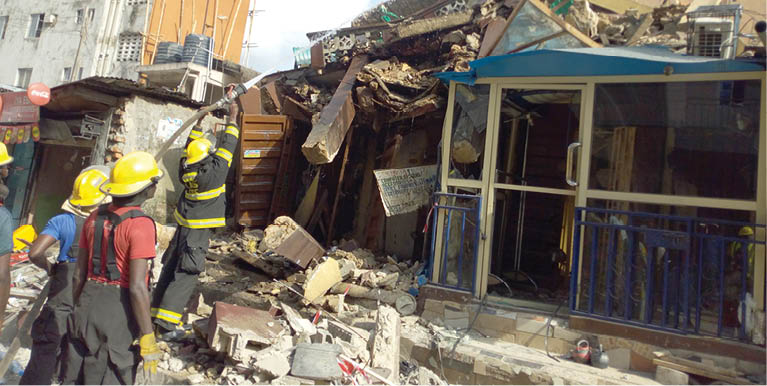Providing lasting solution to building collapse
W ould the Ita-Faaji building collapse in Lagos on March 13, 2019, which left many casualties in its wake be said of a tragedy foretold but ignored? How would a three-storey building have gone down with no pre-warning signal? If this fatal building collapse was preventable, who are those to be held responsible for the […]

FILE PHOTO: Collapsed building in Lagos Island
W
ould the Ita-Faaji building collapse in Lagos on March 13, 2019, which left many casualties in its wake be said of a tragedy foretold but ignored? How would a three-storey building have gone down with no pre-warning signal? If this fatal building collapse was preventable, who are those to be held responsible for the tragic incident – the owner, Lagos State government or the occupants? Why would a building that had been previously marked for demolition on three occasions be allowed to remain until that tragedy struck? What lessons have we learned from past cases of building collapse in Nigeria? When will all structurally unfit and defective structures be identified and brought down before they wreak havoc?
Oftentimes the collapse of a building is a disaster that does not occur naturally. Incessant reports of building collapse in Nigeria have become increasingly alarming and embarrassing in this modern age as there seems to be no end in sight to this menace.
Casting a retrospective look into the history of failed buildings in Nigeria, one will observe that Lagos and Abuja appear to record more of such cases than any other state in Nigeria. Lately, there has been a rise in the number of building collapses in the country and it has become so bad that one can arguably say that a record of building collapse is registered somewhere within the country in every six months. According to a report from the Federal Ministry of Power, Works and Housing, a total of 54 buildings collapsed across the country within a period of four years – 2012 to 2016, while a Tribunal set up by the Minister Mr Babatunde Fashola, discovered that 135 cases were recorded in Lagos alone between 2007 and 2013.
A national daily once reported that there were 33 building collapses in Lagos and 22 in Abuja in 2012; 17 in Lagos and 20 in Abuja in 2013; 13 in Lagos and two in Abuja in 2014. No doubt, these cases of building collapse would have left some fatalities and injuries. Research has it that the most prominent reason for building collapse is lack of quality control and non-compliance with established standards. Professional building experts say faulty architectural and structural design is one out of many identifiable causes of building collapse in Nigeria. This is traceable to the engagement of quacks instead of construction professionals in order to save cost. Another reason buildings go down is the change of use of the building after the construction. For instance, the conversion of a residential building to a commercial one may lead to a building collapse because the initial drawings wouldn’t have taken into consideration the type of load the building may eventually carry. Improper monitoring of building constructions by the government after giving approvals and poor maintenance of buildings after construction have also been identified as part of the causes of building collapse in Nigeria.
Making building laws to regulate the activities of building contractors, architects and construction engineers is not enough, enforcing these laws is what brings impact. Building law not obeyed nor enforced is useless. Government must ensure compliance of building contractors with all established laws on building and construction. Government must enforce laws, not just make them. A stiffer penalty must be given to owners of collapsed buildings and those involved in the construction.
As we commiserate with the families of those who lost their loved ones to the Ita-Faaji building collapse, we call on the government not to allow this case to be swept under the carpet as always done. We hope that the advisory and investigative panel set up by the Lagos State government in the aftermath of the tragedy will do the needful. While we await a report from this committee, we expect arrest and prosecution of the culprits. The owner and the developer of the compromised building must not be allowed to go scot-free because it is on account of their negligence that these innocent school children and others died. Going forward, the government through its building control agencies and regulators, must ensure that only structurally sound buildings that can stand the test of time are allowed to stay.
Kayode Ojewale can be reached via: [email protected]
